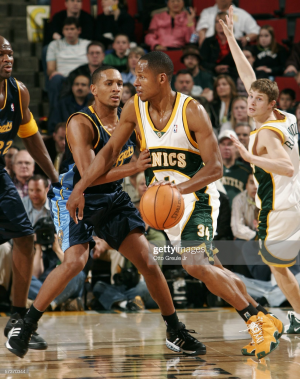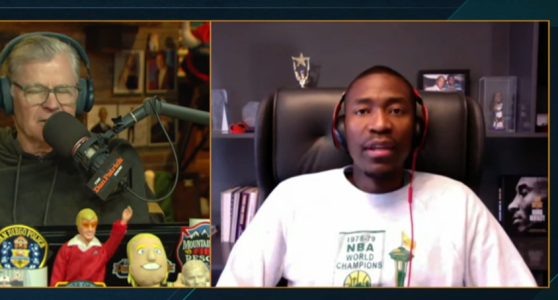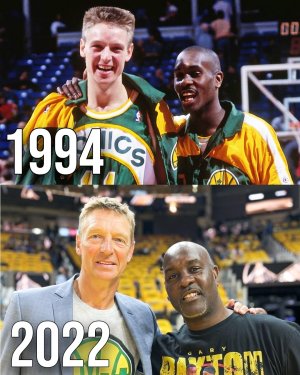[h2]NBA arena backer Chris Hansen to reveal Seattle plan Thursday[/h2]
Christopher Hansen, the wealthy San Francisco mystery man who wants to build a sports arena in Seattle to lure NBA and NHL teams, will unveil his proposal at a news conference Thursday, according to two city sources.
By
Steve Miletich and
Lynn Thompson
Seattle Times staff reporters


ERIKA SCHULTZ / THE SEATTLE TIMES
Christopher Hansen, a San Francisco hedge-fund manager who grew up in the Rainier Valley, wants to bring an NBA team back to Seattle.
Christopher Hansen, the wealthy San Francisco mystery man who wants to build a sports arena in Seattle to lure NBA and NHL teams, will unveil his proposal at a news conference Thursday, according to two city sources.
Hansen, during an interview Wednesday with The Seattle Times, hinted that he was on the verge of revealing his plan.
"We're very close to announcing our offer to the city. That's why I'm here," the 44-year-old hedge-fund manager and Seattle native said in The Times offices.
Hansen said he is only reluctantly stepping forward now because of the intense interest in and speculation around his arena proposal, the details of which are still not known. While he acknowledged that an arena can't be a burden on taxpayers, the package is expected to include a combination of private money and tax revenues spun from the facility.
Speaking in self-effacing tones, Hansen talked about his deep Seattle roots, his modest upbringing in the Rainier Valley and his desire to help a city where he still closely follows all the professional sports teams.
The onetime paperboy and dishwasher talked about sobbing as a child when the Sonics lost in the NBA Finals in 1978 and his elation when they won the world championship a year later.
As the final buzzer sounded in Game 5 and Sonics point guard Gus Williams hurled the game ball skyward, Hansen, then 11, watched from his Seattle home in what he calls a defining moment in his life.
He recalled hearing the honking horns and skipping school for the city's massive celebratory parade.
Hansen, dressed in a suit and an open-collared shirt, said he wants to recapture that feeling by translating his business success and making a significant personal investment, along with other investors, in a new arena and NBA team.
"This isn't about Chris Hansen," he said. "This is about an NBA team and a new arena."
Hansen said owning an NBA team is a dream he has had since college, and that this is the right "moment in time" to pursue it, despite having two young children and a growing business he started in 2008.
Interest in the arena proposal has soared in recent weeks, following The Times' disclosure that Hansen and the city have been engaged in intense talks since June. The cost of an arena has been estimated at $400 million, and buying an NBA team would add hundreds of millions more.
Adding to the picture is a March 1 NBA deadline for Sacramento to develop a viable plan for a new arena or risk losing the Kings franchise.
The NHL also has expressed a strong interest in Seattle if an arena is built, prompting speculation about the financially troubled Phoenix Coyotes moving to Seattle.
Hansen described his interest as building an arena and attracting an NBA franchise, saying others would have to come forward with a hockey proposal. He declined to say if hockey is crucial to a profitable arena, although others have said that it would be.
Hansen, who has acquired property in the Sodo District just south of the Safeco Field garage, declined to discuss details of his proposal, citing continuing discussions with city and county officials. He characterized the talks as sensitive and complex, saying the proposal was a long way from becoming a reality and that it could easily be derailed.
But he said, "I think we are very close to reaching an agreement with the city and county."
He wouldn't discuss the Sacramento situation, saying he was acutely aware of what Seattle went through when Sonics owner Clay Bennett moved the team to Oklahoma City in 2008 after failing to secure a new arena.
Already, however, Hansen has spoken with NBA Commissioner David Stern, who has said he is open to locating a team in Seattle but that new teams won't be added to the league.
Throughout Wednesday's interview, Hansen focused on his personal story and affection for Seattle; his parents and most of his extended family live in the area.
He described how he grew up poor and largely put himself through San Diego State University and the University of Southern California Marshall School of Business. He now manages more than $3 billion in public and private investments as managing partner of Valiant Capital in San Francisco.
Seattle City Council President Sally Clark said she and council members Bruce Harrell and Tim Burgess met briefly Wednesday with Hansen at City Hall. The meeting lasted about 10 minutes and was "a chance for him to kind of introduce himself," Clark said.
He gave no details about financing or specific plans for the arena, but he seemed to want to get to know council members, she said.
The meeting was in the mayor's conference room, but Mayor Mike McGinn left while council members asked Hansen why he was interested in an arena.
"His basic answer was, 'I'm a Sonics guy,' " Clark said.
Council members will be briefed on the arena proposal Thursday morning.
King County Executive Dow Constantine said Wednesday that Hansen contacted his office a few weeks ago. He assigned a few staff members to work with Hansen, Constantine said, and they have been "communicating back and forth." He declined to elaborate.
In his interview with The Times, Hansen said he wasn't interested in lobbying or political posturing. Rather, he said, the terms of the arena proposal should stand on their own merits.
"This is for the people of Seattle to decide if it fits their needs," Hansen said, adding that he did not want to be seen as a hero or savior.
While details behind Hansen's effort haven't been disclosed, Hansen wrote in a June email to McGinn's aides that it was his desire to proceed "without a large public outlay."
McGinn also said potential investors are aware that city voters in 2006 overwhelmingly approved an initiative that says the city must make a profit on any investment it makes in a sport arena.
He also referred to "direct and indirect contributions" that could be made by the city.
As part of a deal, the city could be asked to allow taxes on admissions, parking and increased property values in the area around an arena to be used to pay off debt, according to sources familiar with the arena discussions.
Supporters are likely to argue that the taxes wouldn't be generated without an arena, one source said.
But there are almost certain to be sharp questions, centered on traffic, parking and future development around an arena. Both the Seattle Mariners and maritime and industrial interests in the Sodo District likely will have concerns.
Hansen said the proposed arena site is an ideal place, because it already is zoned for stadiums, would have minimal impact on the surrounding community and has convenient access to freeways. He also noted that interest rates are low, making it easier to finance an arena.
His visit to The Times represented his first public step in introducing himself to the region, helped by a high-profile public-relations firm with experience in navigating Seattle stadium deals.
According to a biography supplied by his representatives, he was born in San Francisco and moved to Seattle in 1973 with his mother after his parents separated. They lived in a rental house near Roosevelt High School.
In the interview, Hansen said had been deeply influenced by his mother, who also was a social worker for Catholic Community Services and the Children's Home Society. He said he wanted to transfer what she taught him about personal responsibility and ethics and apply it to NBA ownership.
In 1976, the family bought a home in the Rainier Valley.
Hansen attended Fairview and Stevens elementary schools, as well Blessed Sacrament and Blanchet High School for his freshman through junior years.
He transferred to Roosevelt for his senior year, after his parents no longer could afford tuition for himself and four siblings. He graduated in 1986.
His first job, at age 10, was delivering the South County Journal. At 13, he began delivering The Times and two years later began working as a dishwasher and prep cook at the Leschi Lake Café.
He graduated with honors from San Diego State University 1991 and then returned to Seattle, renting an apartment in the Leschi neighborhood. He worked for three years as a financial consultant for American Express Financial Advisors, according to the biography.
In 1994, he entered USC, where he earned an MBA.
He went to work in 1996 as a research analyst with Montgomery Securities in San Francisco. He was promoted to senior analyst in 1999 and principal in 2000.
In 2001, Hansen joined the San Francisco office of New York-based Blue Ridge Capital as senior analyst and partner.
After seven years, Hansen founded Valiant Capital in 2008.
He is married to Kimberly Airey Hansen. His two children, Peyton and Reade, are from a previous marriage. His mother, Margaret Mazen, of Seattle, and father, Robert Hansen, of Bellevue, live in homes he purchased for them in 2008, according to the biography.
Hansen described wistful feelings when his young children celebrated the San Francisco Giants victory in the World Series in 2010.
"I've been waiting ... years," he said, referring to the Sonics' last world championship. "I'm all about trying to make it happen."




































